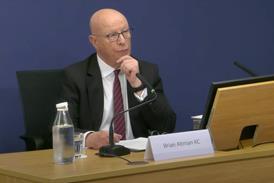The demand for legal services from England and Wales has become increasingly international over the last decade and the Solicitors Regulation Authority needs to take account of this in the way in which it regulates.
Our role is to promote the highest standards within the legal system of England and Wales to ensure consumer protection. But we need to do so in a way that does not constrain a competitive and vibrant legal services sector. We want to support the development of England and Wales as a hub for legal services - a market synonymous with excellence and standards - and help to promote an environment where law firms headquartered in England and Wales can flourish abroad. And we also need to protect the consumer in this jurisdiction from harm that might emanate from abroad, but in a proportionate manner.
The launch of outcomes-focused regulation on 6 October, with the new Handbook and Code of Conduct, paved the way for a more dynamic legal services market in England and Wales. We now need to clarify how this approach should be applied outside England and Wales. It is with this in mind that this week we launched a consultation on our proposed approach to regulating in a global legal services market.
‘The Regulation of International Practice’ sets out the SRA’s proposals on how we might regulate international practices that have their headquarters, centre of gravity or equivalent, in England or Wales. Our aim is to ensure that the standards expected by clients are upheld internationally, and that clients and consumers can be sure that any legal services delivered under a ‘brand name’ associated with the English and Welsh system come with clarity about how they are regulated, and how problems, if they arise, would be dealt with.
But we also want to regulate in a way that supports the competitiveness of this market. The consultation includes a range of proposals aimed at cutting through the maze of international regulation while upholding consumer protection. If accepted, our proposals would also mean a reduction in regulatory burdens on overseas branches, alongside potential savings in paperwork and costs for international law firms. For instance, around 160 branches of law firms which currently have to register and comply separately with SRA regulation, even when overseas, would instead be covered by a single international ‘passport to practice’ which would require more limited, but focused regulatory compliance.
The introduction of global entity regulation, which we are proposing, will support international firms wishing to develop single, global businesses. Under these proposals, firms will be able to set up structures to operate in any form that is allowed in other countries without needing to comply with additional recognition requirements from us. We would then only require the application of the SRA Principles to the group outside of England and Wales. The rest of the Handbook would be disapplied. These proposals will apply equally to small firms with operations overseas and reduce the bureaucratic hurdles involved from our end in international expansion.
The proposals, if accepted, could help to promote England and Wales as an attractive location for law firms to be based. We are recommending that a foreign law firm that wanted to have the SRA as its oversight regulator would be able to do so if it had an operation in England and Wales. SRA recognition would provide an international hallmark of the highest standards and compliance - attractive to clients and reassuring to insurers.
A radical change in how we allow foreign lawyers to work in partnership with solicitors, currently governed by the registered foreign lawyers scheme, is also long overdue. At the moment, the rules only allow lawyers from some jurisdictions to become partners in SRA-regulated firms.
We want to simplify the process for English firms bringing in foreign lawyers as partners and liberalise the market without compromising standards. Subject to a stringent test on individual suitability, we are proposing to allow lawyers in many key emerging markets that have not previously been able to do so, to enter into partnerships with English and Welsh law firms. This will enable English and Welsh law firms to bring into their partnerships talented lawyers from other countries who were previously barred because, for example, their home rules required them to give up their practising certificates when joining a foreign firm.
Our proposals represent a radical shift in comparison with our previous approach to the regulation of overseas practice. The consultation is wide-ranging and includes questions on all aspects of our approach to authorisation, supervision and enforcement. We welcome views on any aspects of our proposals.
This is just the beginning of a debate to ensure we come up with a practical approach that is good for clients and consumers, good for firms and good for the legal services market.
The consultation closes on 15 February and can be found on our website. We look forward to receiving your responses.
Charles Plant is chair of the board of the Solicitors Regulation Authority

























No comments yet